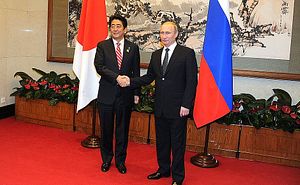On May 6, Japanese Prime Minister Shinzo Abe held an informal meeting with Russian President Vladimir Putin in the subtropical Russian city of Sochi. The three-hour talks concluded with both sides agreeing to streamline the negotiation process aimed at resolving their territorial dispute and concluding a peace treaty based on an undisclosed “new concept.” This nebulous wording gives Abe enough room for interpretation and allows him to pass it off as a diplomatic achievement just in time for the upcoming parliamentary elections.
Unlike most of their previous meetings, these talks between Abe and Putin were strictly unofficial, not preceded by briefings from the Japanese Ministry of Foreign Affairs, and not followed by a press conference. Such reticence might be explained by Japan’s reluctance to formally bring up the contentious issue of the territorial dispute, so as to ensure that the Abe-Putin meeting was held in the spirit of good will.
The timing of Abe’s visit, too, was peculiar. It came weeks before the annual G7 summit, which this year is being hosted by Japan in Ise Shima. Meeting with Putin before the summit appears to have been a symbolic gesture meant to emphasize the importance that Abe attaches to Russo-Japanese relations. Moreover, Upper House elections to the Diet are scheduled for June and will serve as a test of public confidence in Abe and his cabinet. While his approval rate has consistently been over 40 percent (aside from a brief dip to 37 percent in August 2015) and his Liberal Democratic Party is enjoying a comfortable majority in both Houses of the Diet, Abe has had few meaningful achievements to show to the Japanese public in recent months. With Abenomics effectively failing to reinvigorate the economy, and prospects for substantial thawing of ties with China remaining slim to none, even a glimpse of positive developments in Russo-Japanese relations might well constitute a diplomatic success.
Additionally, Abe now has arguably the most room for maneuvering with Russia since the inception of the Ukrainian crisis. With the presidential race in the United States about to get into full swing, and the Obama administration reaching its final year, America now exerts less influence on Japan’s foreign policy, which gives Abe more freedom to defy Washington’s desire that he eschew contacts with Putin.
Generally speaking, Tokyo’s interests in rapprochement with Moscow are two-fold. Firstly, energy-starved Japan is committed to ramping up LNG and oil imports from Russia, as it gradually has for a number of years. Secondly, Abe still has hope of making headway on the Northern Territories issue and signing a peace treaty, despite neither side showing willingness to cede ground in the dispute. Meanwhile, Russia by and large continues to experience international isolation, and its pivot to China has been stalling, with Beijing demonstrably not ready to sacrifice its Western interests in exchange for improved relations with Russia. Naturally, these circumstances could not have escaped Tokyo’s attention, and Abe appears intent on taking advantage of them. Japan could serve as a mediator between Russia and the G7, partially alleviating the tension between the two, as well as propose closer energy cooperation on more lucrative terms than China, thus decreasing Moscow’s dependence on Beijing. In exchange, Russia could make concessions on the territorial dispute, presenting Abe with a much-needed foreign policy victory.
Making good on these plans, however, will be challenging. In the Abe-Putin talks, both sides agreed on an eight-point plan of bilateral cooperation, particularly in the energy sector. Leaving aside the lack of specifics, however, two obstacles would likely hobble Russian implementation of any major energy deal with Japan — the scarcity of necessary infrastructure and difficulties in developing new gas and oil fields. The only LNG plant in Russia at the moment is Sakhalin-2, which is operating at full capacity, with gas being shipped to South Korea, Taiwan, and Thailand, not to mention China and Japan. Russia’s pivot to China entailed ratcheting up LNG exports to Beijing, which naturally leaves Moscow with a smaller volume of gas available for selling to Tokyo, and LNG production cannot be meaningfully increased without building another plant. While there are plans to put another facility in use by 2019 as part of the Sakhalin-1 consortium, the construction — which is estimated to cost $8 billion — is projected to raise the expenses of the whole project and eventually generate less revenue. Additionally, the plant’s launch is likely to be postponed, similar to the “Power of Siberia” China-bound gas pipeline. Further, Western sanctions and the sharp drop in hydrocarbons prices have aligned to complicate the issue of developing new oil and gas fields or even operating existing ones. For instance, in 2015, Sakhalin Energy responsible for operating Sakhalin-2 lost almost 37 percent in profits.
Nevertheless, the immediate results of Abe’s visit to Russia can be construed as successful — the agenda, traditionally centered on the disputed islands, has been updated with plans for strengthened energy ties; the bilateral relations have seemingly been imbued with a positive dynamic; and Abe has the vaguely phrased agreement of moving the territorial dispute forward to present to Japanese voters ahead of the Upper House elections.
Dmitry Filippov is a PhD student at the School of East Asian Studies, University of Sheffield.
































